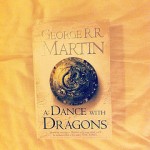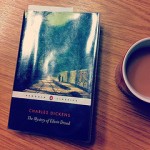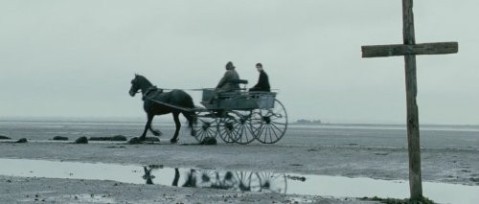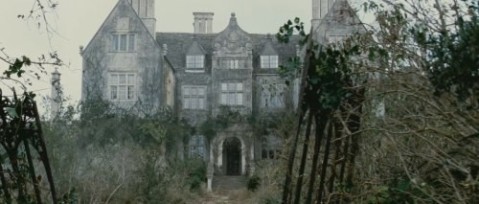Bingeing on John Le Carre
April 5, 2012 § Leave a comment
Life recently- it went from hot summer weather to snow in a week, typical spring. I’ve also been reading a lot of John Le Carre.
I finally read Tinker Tailor Soldier Spy, and I loved it. I inhaled it, and was finished in under a week. Then I promptly ran down to the library to try and find The Honourable Schoolboy and Smiley’s People in order to complete the trilogy, but Sheffield Library was all out. This is my only gripe with libraries, sometimes you are desperate to read something and somebody else got there first. I am now first in queue for The Honourable Schoolboy, so I should be catching up with Smiley in a couple of weeks.
I’ve been meaning to read more John Le Carre for years after studying The Spy Who Came In From the Cold at university. I absolutely loved it, and was reminded of this when the TTSP film came out last year. I enjoyed the film, and when someone bought my Mum the book I promptly stole it to read for myself. And it was love.
Tinker Tailor Soldier Spy follows the enigmatic George Smiley, forcibly retired from the Secret Service (known as the Circus) before being asked back to secretly investigate a high-ranking mole. Smiley is quietly brilliant and incredibly subtle. It is necessary to concentrate on every last word of the novel to keep up with what is going on, but it is an absolute joy to read. I don’t want to give away too much about the plot, but if you’re interested in 20th Century European history then this would be an interesting read for you. I love travelling in Europe, and I really enjoyed reading about the (seemingly) exotic lives of the spies. Except it wasn’t exotic or glamorous really, it was just a grubby game with one side point scoring against the other. Every character seems to have a shattered, empty private life because they’ve been forced to give up everything for the Service. It’s hard not to be drawn in by the action though. Although the identity of the mole provides much of the novels tension, the main thread is Smiley’s own personal battle with his Russian counterpart Karla. This is why I need the next book in the trilogy- I need to see Smiley triumph.
After my library disappointment I picked two of Le Carre’s more recent works to fill in the gap until I can get my hands on The Honourable Schoolboy. They are his two most recent novels, Our Kind of Traitor and A Most Wanted Man. This was a mistake; I thought I wanted to read John Le Carre when I really to read Cold War Le Carre. Le Carre’s more recent novels are well written thrillers, as you’d expect. However they lack the classic, understated elegance of his earlier work. These are not the novels he will be remembered for but they fill an entertaining afternoon.
This story, luckily, has a happy ending. When I went back to the library to dump my two disappointing Le Carres I had a poke around the Thriller section just in case and came out triumphant with The Looking Glass War, published in 1965. Vintage Le Carre, and I’m so looking forward to reading it.
The many and varied reasons why everyone should read A Song of Fire and Ice
March 22, 2012 § Leave a comment
A Song of Fire and Ice (more commonly known as Game of Thrones) has been a big part of my reading life over the last year, and I sadly finished the fifth book a couple of weeks ago. For the present there are no more, and not likely to be for the foreseeable future. I read on a random blog that Martin was only going to start writing the next volume in January, so it looks like another five year wait. Le sigh.
Realistically if I were to write a review of A Dance with Dragons, it would consist of me scrawling ‘AAAH’ and ‘IT’S AMAZING’ across the screen. A Dance with Dragons cannot really be taken as a stand alone book; it is meaningless unless you have read the rest of the series. Also if you are unfamiliar with the whole Game of Thrones world it is impossible for me not to reveal spoilers for the earlier books. There are five books currently, detailing the fight for power over the fictional Seven Kingdoms of Westeros. The cast of characters and their various feuds, battles and allegiances is dizzying, which is why I recommend reading the books one after the other without stopping. I read the first one last August, and although I read other stuff the only significant break I had was between the fourth and fifth book.
Anyway I said I was going to give you reasons why you should make this massive commitment, and reasons I have!
1. No character is entirely good or completely bad
Game of Thrones begins with Ned Stark lopping off the head of a teenage boy, and as a character he’s about as moral and noble as you’re going to get. However, even the characters that seem totally evil are hard to hate once Martin gives you a glimpse inside their heads. In the last volume I even found myself sympathising with Queen Cersei (I KNOW!). By allowing different characters to narrate the story, a method made popular by Wilkie Collins and Bram Stoker, Martin ensures that no one view point is presented. This is in keeping with his obvious intention to present a full history of a political conflict between many different factions.
2. Martin is inspired by history
A Song of Fire and Ice is a medieval fantasy based in a fictitious world, but inspired by the wars, betrayals and political intrigue of real history. The medieval period has often been an inspiration for fantasy, but Martin wanted to more realism into the genre, and focus more on political intrigue rather than magic. He also wanted to show the gritty, hard reality of medieval life. The Wall was inspired by Hadrian’s Wall in the north of England, and Martin was also inspired by the history of the U.K, such as the Crusades and the Wars of the Roses.
3. There are some really great female characters
Women are relegated to the status of property in Westeros; raped, sold, married, murdered, brutalised, and mocked. It is hard to read sometimes, but I guess that’s how things used to be. Despite, or perhaps because of this, there are some really interesting and awesome female characters trying to make their way in a Patriarchal society. My favourite is Arya, who manages to escape while her more refined sister Sansa is trapped. There has been controversy about the treatment of women in Westeros, especially since the TV series, but the issue hasn’t stopped me enjoying the books.
4. The books are unpredictable
In Lord of the Rings, it is obvious that Frodo is never going to die and that he is going to succeed with his quest. In A Song of Fire and Ice nothing is certain and no character is safe. This once led me to cry out loud with shock and disbelief on a packed commuter train.
So you’ve heard my reasons, and really the best advice I can really give you (this may be odd coming from the writer of a book blog) is to watch the HBO TV series. The first season has just come out on DVD and the second will be shown starting April 1st. If you love it, as I did, then the books are definitely for you.
Don’t go back to Pemberley.
March 6, 2012 § Leave a comment
Today feels like the first day of spring. I may be being overly optimistic, the beginning of March is a little early after all, but it feels like the time of reading books wrapped up in bed is coming to an end for this season. One of my best memories from last summer is devouring almost the whole of One Day sitting under a tree in the park, before going for a leisurely al fresco meal. It’s not often that Sheffield feels like being on holiday and I want those days again. Last weekend I finally finished reading A Dance with Dragons and I feel bereft. I know that I face another five years of waiting before the next book comes out, and I’m FURIOUS that I’ll lose the momentum I’ve built up reading the whole series at once. In danger of letting my reading lapse in favour of becoming George R.R.Martin’s full-time stalker, I needed a proper pick-me-up of a book, something that would stop me googling the price of airfare to New Mexico. So I made the mistake of going back to Pemberley.
I am a huge Austen fan, I first read Pride and Prejudice when I was twelve. I did not in any way appreciate it at the time, but I’ve read it countless times since. In fact I’ve read all Austen’s novels multiple times, a side effect of having to study her at university. Check me out, my expensive education may have been pointless and ultimately resulted in me being in debt forever, but I sure know my Austen. A hollow victory perhaps. Due to my love for Austen, and my snobbish Lit student attitude problem, I tend to be dismissive about sequels. I don’t want to go back to Pemberley; I don’t want to know anything about Elizabeth and Darcy’s marriage. Austen was wise enough to leave things at the altar; she knew that no marriage could be perfect. I also suspect that Austen realised that the excitement of her novels results largely from the uncertainty that came before engagement; once a young lady had made a good marriage she was settled and her place in society largely secured. And Austen’s young ladies all make fabulous marriages.
I tried, and failed, to make it through Pride and Prejudice and Zombies, and have distant memories of a terrible trashy novel I read as a teenager where Elizabeth was barren and Darcy distant. So I wasn’t exactly excited at the prospect of Death Comes to Pemberley. It is at least, I thought to myself, an original idea, and it’s written by P.D. James so it can’t be totally awful. And it wasn’t; it just wasn’t great. The novel centres on a murder in the woodlands of Pemberley, which involves all of our favourite characters from the original novel. As this is a mystery story I don’t want to give spoilers, but I can say that I had no real issues with the plot. It was a perfectly well written, serviceable murder mystery. It was just a bit dull, missing the spark of social intrigue that makes Austen so readable. The novel is 300 pages long, and nothing happens for the first 100 except setting up for a ball that never happens. Perhaps the biggest missed opportunity in my opinion was the murder happening the night before the ball instead of during it. Lydia staggering hysterical into a ballroom full of the cream of society, shrieking that Wickham has been murdered would have been an excellent scene. Alas, it was not to be. Fellow Austen fans will be relieved to know that everything is sorted out fine in the end, and Elizabeth even manages to get Darcy to open up about his feelings. Yeah right, like that would ever have happened.
I have never read anything by P.D. James, so I have nothing to compare Death Comes to Pemberley with, but I’m going to assume that her success is well deserved. However I think that imitating Austen is a step too far for even the most accomplished writer. It’s nothing to be ashamed of, but I think everyone should resist the urge to go back to Pemberley. It never turns out well.
The everlasting mystery of The Mystery of Edwin Drood
February 24, 2012 § Leave a comment
It was Valentine’s Day last week, and because I’m such a hopeless romantic I decided to read a book about murder, broken engagement and creepy obsessive love. I’ve been desperate to read The Mystery of Edwin Drood since seeing the BBC adaptation just after Christmas, mainly because I wanted to see where the book actually ended. I quite liked what the BBC did with it, but I’m not sure it was quite right. However there is no escaping the fact that Dickens only completed half the novel before his untimely death, and a suitably dramatic end had to be got from somewhere.
Edwin Drood the novel tells the story of a young couple betrothed from birth by their deceased parents. Rosa is at school in a nameless Cathedral town and Edwin comes to visit her, staying with his choir-master uncle John Jasper. Unfortunately this uncle is not quite as dedicated to his nephew as everyone thinks and is dangerously, obsessively infatuated with Rosa. Then one night Edwin disappears without a trace and suspicion falls on Neville Landless, another orphan, who with his sister Helena has just moved to the town from Ceylon to be educated. Finding themselves in the middle of this mystery are Rev. Crisparkle, Neville’s mentor, and Mr. Grewgious, Rosa’s guardian.
Edwin Drood was a bittersweet reading experience for me because it was so good (so, so good) that, to my constant disappointment, I kept forgetting it was unfinished. I was surprised how far into the mystery Dickens had progressed considering he had only got half way through and it makes me sad to think that perhaps he had some incredibly exciting twist to lay down that would have excited and delighted us all. In a way I suppose it was quite nice of him to leave us a little mystery to ponder, and even though the novel is unfinished it still feels balanced. It ends with the mysterious Mr. Datchery, who has clearly taken up residence near the Cathedral to watch John Jasper, making a discovery to his benefit. I like to think that Mr. Grewgious employed Mr Datchery, who is clearly someone in disguise; Mr. Grewgious who is now officially one of my favourite Dickens characters (now there’s a subject for a post all on its own).
Dickens outlined the general plot of Edwin Drood in a letter to his friend John Forster, part of which you can read here, so we do kind of know what his intentions were. I’m being deliberately vague because I don’t want to be guilty of spoilers, but I am glad that the gold ring ended up playing a crucial part as I thought it would. Nothing is ever accidental or wasted with Dickens, there are connections everywhere. I also correctly guessed who Rosa was going to marry, because everyone always has to marry someone. This novel is definitely worth picking up, and may even be a good start for someone who hasn’t read much Dickens before; it is only 250 pages long and the plot is relatively simple for Dickens.
It seems like I haven’t really done much but read, eat and sleep lately and time seems to be going too quick. The weather was so beautiful yesterday that it felt like spring, which fills me with dread (though it is raining again now). It just makes me realise that the days when I’ll be expected to leave the house sans thick black tights are fast approaching. I am very much a coats and scarf girl, and have very pasty legs. Despite that it is very nice to feel that it is the end of January and February, two months so devoid of joy and light that I always feel compelled to sit on the sofa watching bad TV rather than engaging with a book. I have to find extra juicy, interesting things to tempt me out of the slump. This time last year I was reading M.R. James, a real treat of the sort that doesn’t come along very often at all.
I spent Saturday afternoon screaming in the cinema and hiding my face in my boyfriend’s shoulder.
February 14, 2012 § Leave a comment
Film stills taken from here
I don’t really like to admit that I had to ask for help, but I don’t think I would have made it through the film of The Woman in Black without my boyfriend’s shoulder. Not even covering my eyes seemed sufficient. Before you write me off as completely lame I can tell you that the cinema was full of teenagers trying to be cool, and they were shrieking as loud as I was. Look at the second picture down; do you see the Woman in Black’s ghostly face? Now tell me that you could cope with that, and worse, happening repeatedly in front of you for two hours. I found myself in this regrettable situation because I love The Woman in Black, the novel, so incredibly hard. This is for the simple truth that Susan Hill writes ghost stories like M.R. James, who is dead and can write no more. If there is one author who I could forget I had ever read on a yearly basis it would be M.R. James, and I am glad that Susan Hill is reinvigorating this genre in similar creepy, creaky style. Eel Marsh House is so perfect, opening its fetid arms to embrace Arthur Kipps and drag him to his certain doom.
My love for this novel was always going to make the film problematic for me. The more I love a book the less I find I am able to watch film versions without being critical. I have to say the setting was perfect, the house and the marsh and the village looked exactly as did in my head, but as was to be expected there are many differences between the novel and the film. With more ghosts, some hideous on-screen child deaths and a collection of very odd Victorian children’s toys, everything that was hinted subtly at in the novel was brought to garish life on-screen. Also the beginning and end were completely changed. No biggie.
I think my main problem with the film as a whole was the decision to give Arthur a dead wife from the start, a wife lost in childbirth. This took away an element that was to me important in the success of the novel; the idea of Arthur Kipps as a fresh, unsullied, pragmatic young man rushing forward without a supernatural thought in his head. Daniel Radcliffe’s Arthur is already half-broken, and although he has his son to care for, the grave holds less terror for him. I won’t give away any important twists, but I also think that the passage of time between Arthur’s stay at Eel Marsh and the horrifying climax of the novel makes the final pages all the more shocking while the ending of the film just seemed inevitable from the start.
Perhaps these problems with the film are just my problems because I like the quiet, slow, menacing sort of terror rather than the jump-out-of-your-seat-screaming kind. I feel like the potential for this film to have been a truly classic, understated horror classic like Rosemary’s Baby has been sacrificed for cheap thrills. Maybe they don’t make films like that anymore though, and maybe I’m just sucking lemons at the back of the cinema whining about the ‘good old days’.
TV free evenings with The Tiger’s Wife
February 13, 2012 § Leave a comment
I’ve been making a huge effort to turn the TV off lately, and it’s making me feel calm. Last night I sat in bed with my cat friend and read 80 pages of A Dance with Dragons, and it was epic. I’m starting to feel a little disgusted with George R. R. Martin though; how can you be so cruel to your characters?
Over last weekend I read The Tiger’s Wife by Téa Obreht, to have a break from all the horror. Perhaps a novel about the death of a beloved Grandparent set across the backdrop of the Balkans conflict was not the best choice, but I’m think I’m pretty desensitised after Game of Thrones. I love folk tales and fairy tales, so I knew I was really going to enjoy Obreht’s first novel.
I don’t usually say this, in fact I usually say the opposite, but I think this book should have been longer. It was an epic undertaking, so the novel itself should be an epic. Another 300 pages would have given Obreht more time to flesh out Natalia, as it was I felt she was lost amongst the story she was telling and I didn’t feel a connection with her. The novel felt unfinished, and although I loved the stories with a story, the main narrative strand was drowned by them. I kept reading for the parts about the Tiger’s Wife and the Deathless Man. I loved the clever, subtle little connection Obreht dropped in between them. It was blink and you miss it, but one of those things that marks Obreht out as a great writer. However, although I enjoyed the Tiger’s Wife and the Deathless Man as stand alone stories, I didn’t really see how they connected with the overall plot. I was expecting to find out something about Natalia’s Grandfather, but instead these were just things that had happened to him. Similarly, Natalia’s journey to collect his possessions from the clinic where he died was a bit of an anti-climax. I’m guessing the purpose was for her to discover that his copy of the Jungle Book was missing, therefore confirming the truth of the Deathless Man. It didn’t feel like enough of an ending though, and I finished the book profoundly unsatisfied. The writing was great and Obreht’s imagination is extraodinary, but I wanted more.
I know there’s been some controversy over The Tiger’s Wife winning the Orange Prize. I can’t really comment because I haven’t read any of the other books on the shortlist, but surely we should all be happy to see a young writer succeed rather than debating her worth. Also, she will make excellent use of the prize money and publicity that more established writers are perhaps not in such need of. I genuinely think that Obreht will go on to write many great things, and I’ll definitely look out for her next novel.
It’s been so cold this week, and we even had some snow. I’ve been reading A Dance with Dragons again, but slowly. Somehow I want to make it last forever.
Winter is still coming: A Dance with Dragons progress report
January 29, 2012 § Leave a comment
After almost three weeks I am 430 pages into A Dance With Dragons; slow progress but I am reading consistently. I had a job interview last week that didn’t go too well and right now I want to curl up into a ball. It was my fourth job interview in the last year and although I know that the industry I want to get into is super competitive and jobs are scarce, the rejection still stings. The grey, dreary weather isn’t helping my mood, and it’s making me wonder if I’m craving fantasy because of how dissatisfied I am with real life.
So far, A Dance With Dragons is surpassing my expectations. It is unbelievably epic. I’d say to anyone who is currently halfway through the series- you have to keep going, just to get to read this book! Game of Thrones has to be the most brilliant series of books I’ve ever encountered, just for the insane level of detail and plotting. I can’t even imagine what George R. R. Martin’s office must look like. How does he keep track of it all?
The Marriage Plot and other stories
January 16, 2012 § Leave a comment
A million years ago, in December, I had a massive case of reading-block and spent the whole month labouring over No Name by Wilkie Collins. Then I cured myself by reading The Marriage Plot in the week between Christmas and New Year. I am in no way suggesting that the latter is superior to the former, it is just interesting to note how reading-block can strike even when you are involved with your favourite authors. I enjoyed No Name while I was reading it, it was just a monumental effort to force myself to turn off the TV and pick up the book.
No Name is classic Wilkie Collins intrigue, with the twist of the secret being revealed in the first part. For the rest of the novel we follow the beautiful and vengeful Magdalen as she seeks out retribution with the help of the audacious fraudster Captain Wragg. I don’t want to give away too much in terms of spoilers (my pro-tip is don’t read the blurb on the back of the book until you’re safely past the big reveal), but I really enjoyed the sparring between Captain Wragg and Mrs Lecount. I also liked Magdalen when she was being brave and clever, but then all her resources crumbled and she had to be rescued by a man. I love 19th Century novels more than anyone, but as I get older I find it harder to roll my eyes and chuckle about the patriarchy over the way some of the female characters are portrayed. Wilkie is one of Dickens’ friends though, so I shouldn’t be surprised. He is also the creator of Lydia Gwilt, from Armadale, one of my favourite fictional characters, so I guess he is forgiven.
It almost seemed a shame to tear through The Marriage Plot so quickly, as it is one of the few books that I allowed myself to buy this year, and a hardback no less! It was all down to my weird self-imposed rule that I have to start a new year with a new book. Jeffrey Eugenides’ third novel details the participants of a college love-triangle in the early 1980s, and after complaining so much about No Name ending with a marriage or two it seems appropriate to talk about The Marriage Plot. Madeleine, beautiful and rich and clever, is a literature major who has written her thesis on the marriage plot in 19th century literature. Madeleine has at least two boys after her, Mitchell and Leonard, and her preoccupation with them, and their’s with her, drags on after graduation and into that tricky first year in the real world.
As a former student of 19th Century Literature, I can of course smile coyly and tell you all how this novel struck a chord with me, how familiar it all seems. Sadly I am neither beautiful nor rich, nor even especially clever, so the only thing I could do was nod enthusiastically every time the name of a novel I’d read was mentioned. When I read The Virgin Suicides as a depressed teenager it was a genuinely transformative experience for me and I will always love Eugenides for that. The Marriage Plot is another coming of age story, and to me it seems to be another tale of a young woman sacrificing her future and holding back from adulthood. Madeleine comes out of the novel apparently unscathed, but we never find out what happens to her, or even what her thoughts on the marriage plot actually are.
The Road goes ever on and on…
January 11, 2012 § Leave a comment
You know those days, so common in early January, when you are numb and so tired dragging yourself out of bed that you feel old? Sometimes it’s just lack of sleep or the sound of a storm raging outside, and sometimes it’s other things. Well life is a journey, and there are good parts, soul destroying parts and long, featureless roads you’ll never remember. My cure for the bad times is to immerse myself in the greatest journey ever written.
This last week has been something of a dark night for the soul. January often strikes me as the worst month to try self-improvement; how can you be optimistic when you are dragging yourself out of bed at 7am in the pitch black to howling wind and rain? I’m back in the office, and things are at a standstill. I feel paralysed with self-doubt over the future, too terrified of failure to take a step forward. I’m sure this will pass, and 2012 will turn out to be a good year. Until then I seek comfort in the written word, in other worlds. There is something wonderfully comforting about re-reading books. Knowing what happens to the characters, freed from anxiety on their part, gives you the luxury to look around a little.
My literary comfort food of choice is Lord of the Rings; specifically the first book. I’ve lost count of the number of times I’ve read the trilogy, and of course The Hobbit, since I was a child. I particularly like the first volume; as soon as I open the first chapter and begin to read about Bilbo’s famous party, I feel like I’ve come home to somewhere safe and familiar. Which is ironic as I used to scare myself to sleep every night as a child listening to a tape of the Radio 4 dramatisation, until I finally felt able to tackle the book aged fourteen. Since then I’ve re-read at least part of the epic trilogy every three years. The black riders still give me shivers.
Tonight I’m going to hurry home, stick the kettle on, and climb under the covers with my cat friend to finish the last two chapters of The Fellowship of the Ring. Again. Then I shall pull myself together and put the much-loved volume back on the shelf, for another year or so. Tomorrow I start reading something new.
2012
January 4, 2012 § Leave a comment
January is my worst month, but I like the clean fresh feeling of welcoming in a new year, and that empowering thought, ‘This year I’m going to be a better, shinier, healthier, thinner, more hardworking version of myself.’ Well, probably not. I am however happy to see the back of 2011, and I have big plans for 2012 career wise. I also want to make something of this blog. Making resolutions just because the clock ticked over into a new date period always seems doomed to fail, but I feel really optimistic about the new year and want to capitalise on my enthusiasm. Here are the reading-related things I resolve to do….
Read a book a week
I always try to read a book a week, which I guess doesn’t sound like much when I claim to be a prolific reader. This is mainly because I like long books. Last year I read both Les Miserables and the Count of Monte Cristo, over 2,000 pages worth of book. Reading books like this takes serious time and commitment, but they are so rewarding. I think I’ll always go for quality over quantity.
Read two Dickens novels, one Wilkie Collins, one Russian & one French novel
My reading goals have been the same for the last couple of years, except last year I didn’t read a Dickens, so this year I get to read two. Lucky me. Wilkie Collins and Dickens are two of my favourite authors, so I ration myself. Also, I suppose I’ve found it hard to get out of that university habit of having a set reading list and I find having a few set texts every year helps me focus.
So, it seems that I have the same hackneyed, boring resolutions as everyone else after all. Still, nothing wrong with trying to be the best person you can be, right?








































